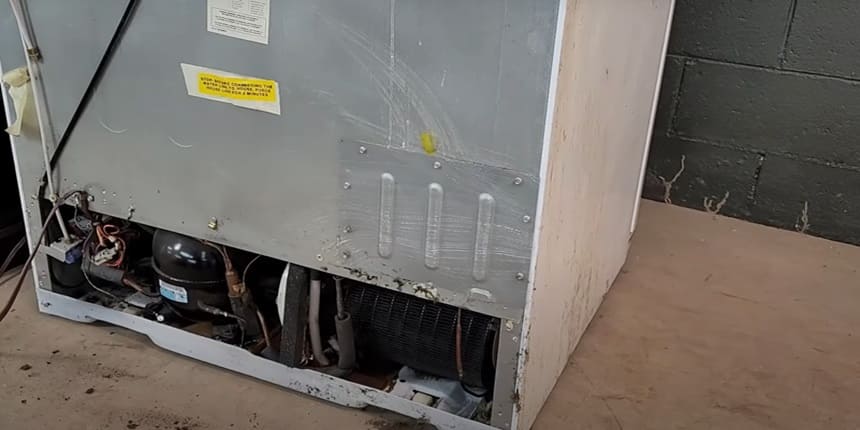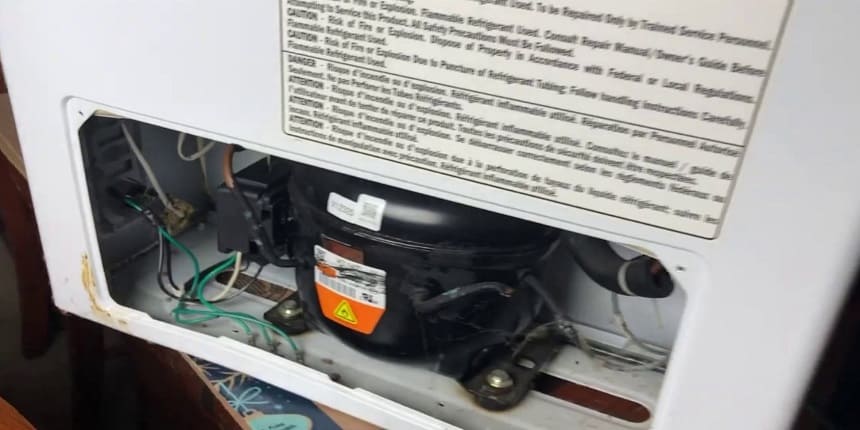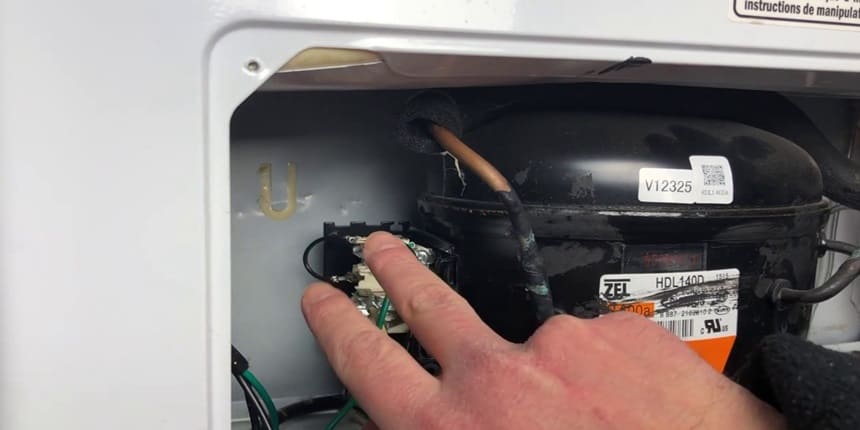If your freezer is not working after a power outage, check the power supply and circuit breaker to ensure they are functioning properly. The sudden loss of power during an outage can sometimes trip the breaker or cause a power surge, which may result in the freezer not turning back on.
To troubleshoot the issue, first, check if there is power to the outlet by plugging in a different appliance. If there is power, then examine the circuit breaker and reset it if necessary. If the problem persists, it might indicate a faulty thermostat or compressor.

4 Common Problems freezer stops working after power outage
Experiencing issues with your freezer after a power outage can be frustrating. Luckily, most problems can be resolved with a few troubleshooting steps. Here are some common issues you may encounter and helpful tips to get your freezer back up and running:
| Issue | Troubleshooting Tip |
|---|---|
| Freezer not cooling | Check if the power is restored and if the temperature control settings are correct. Ensure the door is properly closed and the condenser coils are clean. |
| Frost buildup | Inspect the door gasket for any leaks and replace if necessary. Defrost the freezer regularly to prevent excessive ice buildup. |
| Strange noises | Clean the condenser fan and check for any loose components. Unusual noises could indicate a faulty motor or fan blade. |
| Water leakage | Ensure the drain line is clear of any obstructions and clean the drain pan. Check the water supply line for leaks or blockages. |
If you have tried these troubleshooting steps and your freezer still isn’t functioning correctly, it may be necessary to call a professional technician for further assistance. Remember to always prioritize safety when dealing with any electrical appliances.
Quick Fixes For A Non-functioning freezer turns on then off
One common issue with freezers not working after a power outage is a tripped circuit breaker or blown fuses. Resetting the circuit breaker is a quick and easy fix that you can try.
Locate the breaker panel and look for any switches that are in the off position. Simply flip the switch to the on position and see if that resolves the problem.
If resetting the circuit breaker doesn’t work, you may need to check for loose electrical connections. Make sure the freezer is unplugged and examine the power cord for any signs of damage or loose connections.
Reconnect any loose wires and ensure they are secured tightly. Plug the freezer back in and test if it is now functioning properly.
Problems With Power Supply And Their Solutions
Power outages can often lead to issues with appliances, including freezers. If your freezer is not working after a power outage, there are a few steps you can take to troubleshoot the problem.

Power outage and the impact on the freezer:
During a power outage, the freezer may lose power, causing it to stop working. When the power is restored, the freezer may not automatically resume its normal operation.
One solution is to unplug the freezer from the power outlet and then plug it back in. This can help reset the freezer and potentially resolve any issues related to the power outage.
If unplugging and plugging back in the freezer doesn’t work, you can test the power outlet with another device. Plug in a different appliance or device to see if it receives power. If the outlet is working properly, then the issue may lie with the freezer itself.
Potential Mechanical Failures – Don’t Panic! Fixing Your Freezer After a Power Outage
When a power outage occurs, your freezer may stop working properly due to potential mechanical failures. One common issue is the thermostat settings being disrupted.
To resolve this, check the thermostat settings and adjust them accordingly. Another problem could be dirty condenser coils, which can impede the cooling process.
Regularly assess the condenser coils and clean them to ensure optimal performance. Additionally, compressor and motor issues might be affecting the function of your freezer. Troubleshoot these problems by inspecting the compressor and motor for any signs of damage or malfunction.
In some cases, professional repair or replacement may be necessary. Timely addressing these potential failures can help get your freezer back up and running efficiently after a power outage.
Problems With The Defrost System And How To Fix Them
When experiencing a freezer malfunction after a power outage, one common issue to consider is a problem with the defrost system.
The defrost timer plays a crucial role in regulating the defrost cycle, which prevents ice buildup on the coils.
To check if the defrost timer is malfunctioning, simply turn it clockwise until you hear a click. If the timer does not click, it may need to be replaced.
An additional component to evaluate is the defrost heater. This heater is responsible for melting any ice that forms on the freezer coils during the defrost cycle. If the heater is broken or burned out, it will need to be replaced. Testing the resistance with a multimeter can help determine if the heater is functional.
Lastly, the defrost thermostat should be tested. This thermostat ensures that the freezer reaches the proper temperature before initiating the defrost cycle.
If the thermostat is faulty, it can cause the freezer to not defrost correctly. Use a multimeter to check for continuity in the thermostat and replace if necessary.
| Defrost System Component | Possible Issues | Actions |
|---|---|---|
| Defrost Timer | Not clicking when turned | Replace if necessary |
| Defrost Heater | Broken or burned out | Test resistance and replace if needed |
| Defrost Thermostat | Faulty | Check for continuity and replace if required |
If you’re looking for the best prices on the market right now, then look no further! Check out the options below and take advantage of these amazing deals. Don’t miss out on this opportunity to save big!
Defrost Timer for Freezers
Looking for a defrost timer for your freezer? Check out the options below for the best prices and features. Don’t miss out on improving your freezer’s efficiency!
Defrost Heater for Freezers
If you need a defrost heater for your freezer, you’ve come to the right place! A good defrost heater can help prevent ice buildup and ensure your freezer operates smoothly.
Defrost Thermostat for Freezers
Need a defrost thermostat for your freezer? Check out the options below for great prices and features. Keep your freezer running efficiently!
Addressing Refrigerant Leaks And Low Levels – How to Reset Your Freezer After a Power Outage
One common issue that can occur after a power outage is a freezer not working properly. The problem may be due to refrigerant leaks or low levels, which can affect the overall performance of the appliance.
It’s important to be able to identify the signs of refrigerant leaks, such as a freezer not cooling as it should or unusual hissing sounds coming from the unit. Addressing the problem promptly is crucial to prevent further damage to the freezer.
In some cases, it may be necessary to hire a professional to recharge the refrigerator with the correct amount of refrigerant. Proper refrigerant levels are essential for the optimal functioning of the freezer.
Maintaining the right balance helps in preserving food quality, and energy efficiency, and prolonging the lifespan of the appliance.

Do-it-yourself Maintenance And Preventive Tips
Regularly cleaning the freezer and removing excess ice buildup is essential for the proper functioning of the appliance. Excess ice can obstruct airflow, causing the freezer to not work efficiently. To optimize airflow, it is important to properly organize the freezer contents.
Make sure to leave space between items and avoid overcrowding. Additionally, monitoring the freezer temperature regularly is crucial. A consistent temperature below 0°F (-18°C) is ideal for long-lasting food preservation.
If the temperature fluctuates, it may indicate a problem with the freezer. In such cases, making adjustments to the temperature settings may be necessary. By following these maintenance and preventive tips, you can ensure that your freezer works efficiently and avoids any issues after a power outage.
Freezer Troubles? When To Seek Professional Help And Why
Recognizing when DIY fixes are not enough is essential when dealing with a freezer that is not working after a power outage. While it may be tempting to try and fix the issue yourself, seeking professional help can save you time, money, and further damage to your appliance.
Hiring a professional technician has several benefits. They have the expertise and experience to accurately diagnose the problem and provide appropriate solutions. Professionals also have the necessary tools and equipment to perform repairs safely and efficiently.
It’s important to understand the costs associated with freezer repairs. While hiring a professional may come with an upfront cost, it can save you money in the long run. Attempting DIY repairs without proper knowledge or tools can lead to more significant issues and costlier repairs down the line.
If your freezer is not working after a power outage, consider reaching out to a professional technician to ensure the problem is addressed effectively and efficiently.
FAQ Of Freezer Not Working After Power Outage
Can A Power Outage Damage A Freezer?
Yes, a power outage can damage a freezer as it can cause the food inside to thaw and spoil.
How Do I Get My Freezer To Work Again?
To get your freezer working again, try these simple steps:
- Check if it is properly plugged in and the outlet is functioning.
- Make sure the temperature control is set correctly.
- Clean the condenser coils to improve cooling efficiency.
- Ensure the door seal is intact and tight.
- If none of these solutions work, call a professional for assistance.
How Long After Power Outage Does Freezer Food Go Bad?
Freezer food can go bad within four hours after a power outage. Keep the freezer door closed to help maintain the cold temperature and avoid opening it frequently. Properly cooked and stored food can remain safe for up to 48 hours in a full freezer or 24 hours in a half-filled freezer.
Why Would Fridge Work But Not Freezer?
The fridge may work but not the freezer due to possible issues such as a clogged air vent, malfunctioning thermostat, or freezer door seal problem. It is essential to check these components to determine the cause of the freezer’s malfunction.
Conclusion
To conclude, experiencing a power outage can disrupt the normal functioning of your freezer. It is important to follow the necessary steps to evaluate and fix the issue promptly. By checking the power supply, inspecting the circuit breaker, and assessing the condition of the compressor, you can troubleshoot and potentially resolve the problem.
If the problem persists, it is advisable to seek professional assistance. Remember, regular maintenance and preparation can help prevent such issues in the future.
